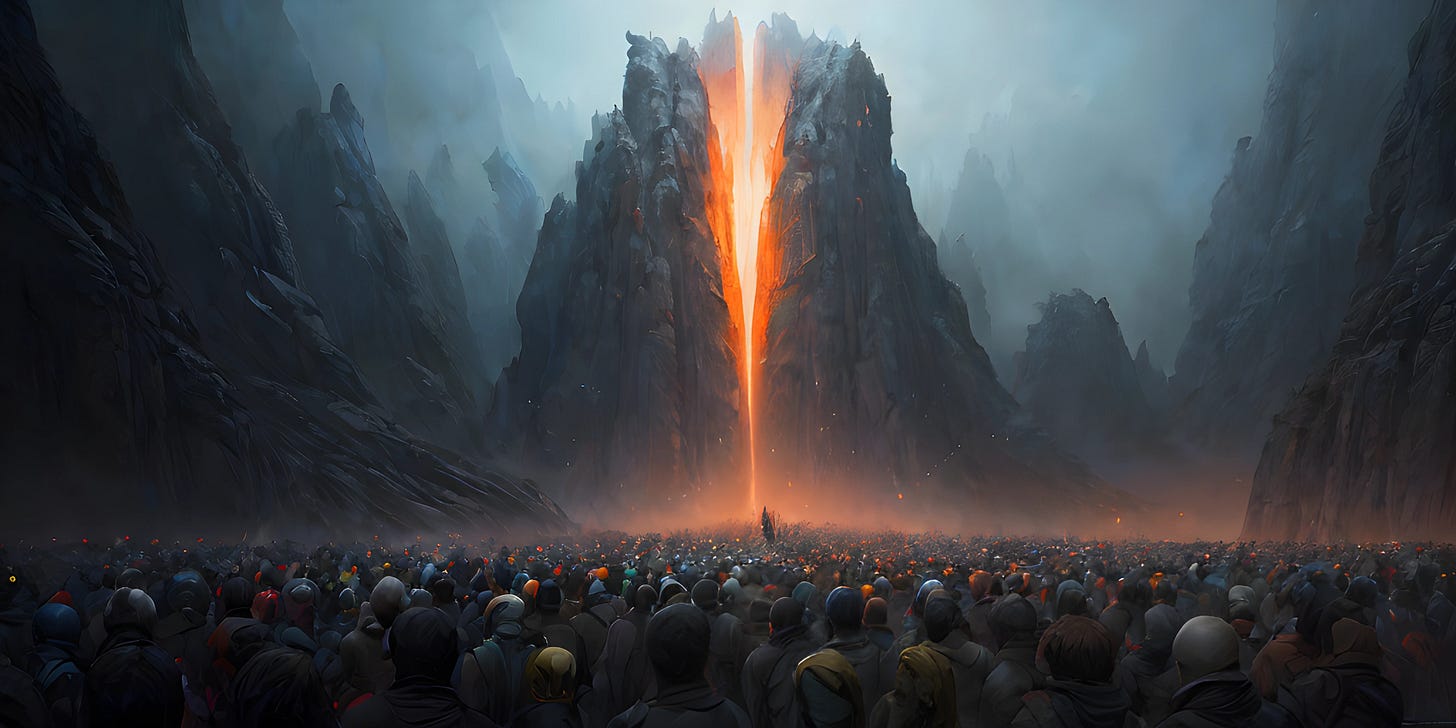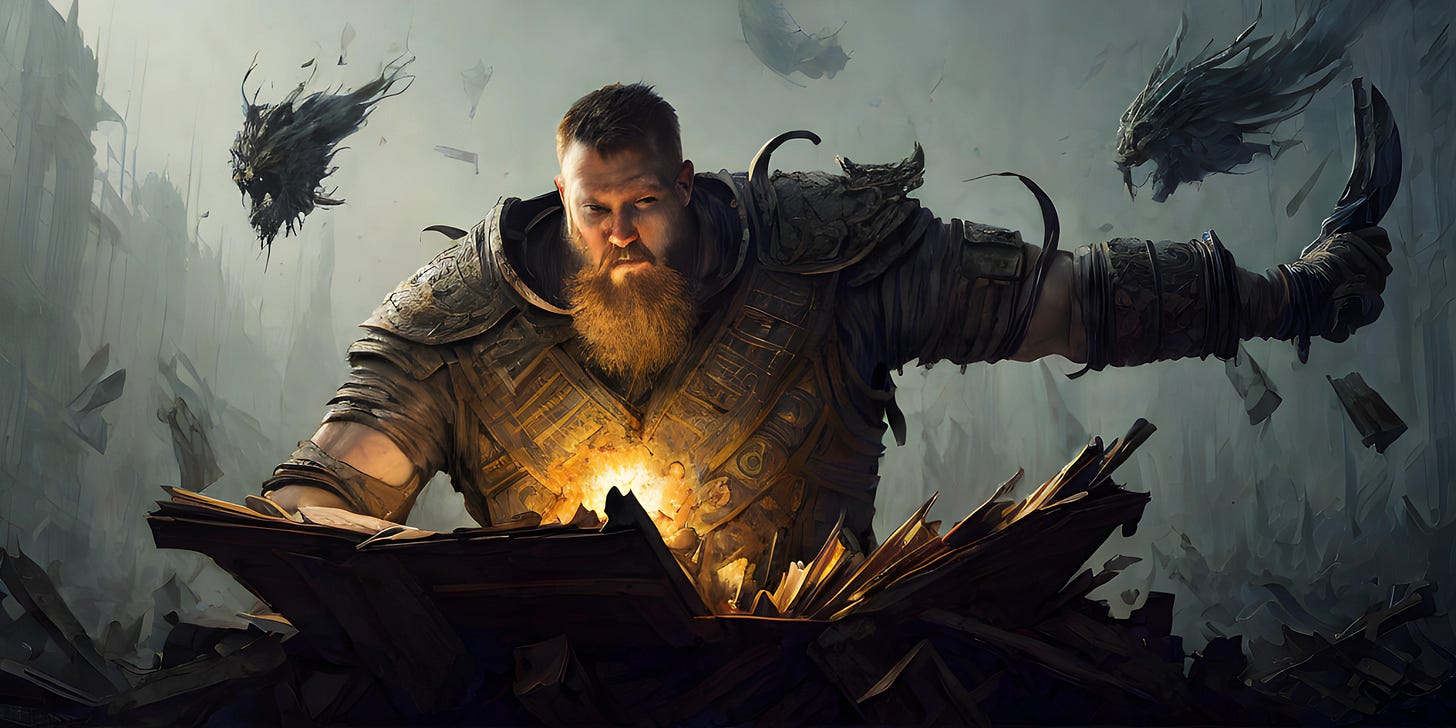Navigating This Century as An Indie Writer/Filmmaker
How to Cultivate a Fanbase In a World Inundated With Content
An old merchant travels across the land with a prized horse who knows he’s irreplaceable. The horse strides with confidence, blinded by his master’s dependence. But then one day the train is invented. Now the merchant only needs the horse to get to the station, forcing him to remain in the stables for longer hours. The horse grows restless, even defiant as he yearns to be needed on those long-stretch journeys. This irritates the merchant. So when the car is invented, he kills the horse and drapes its hide over the seat of his new car.
Writers. Filmmakers…Don’t be the horse. Just like the transportation industry, everything about the film industry is changing right now, and most people don’t realize that they could be turned into hide if they don’t catch up to what’s going on. For those who have been reading my previous articles, you already know what I’m talking about, but I’ll say it again. Creating and marketing “Hollywood quality” movies will be extremely low-cost and much easier for individuals to do. Fantastic…But there’s a problem.
If the cost is reduced to near zero and it’s much easier to do, then big studios will probably kick most of us to the curb, maybe even all of us if AI advances enough. So what will creators do then? The only other recourse will be to roll up our sleeves and go independent, which shows promise as a viable solution when you factor in technology that will allow fans to not only directly invest in movies, but also contribute their ideas for payment.
In a world characterized by 60 percent or more of the workforce being automated away, a UBI for people to live decent lives, and low-cost goods to purchase, it’ll be harder to grow your money, particularly in ways that can give you a sense of purpose.
So platforms that can offer creators the space and tools to develop and share their content with fans who can invest in their projects and financially grow with the creators they love…Well, that already sounds enticing and we’re nowhere close to an automated society.
This is where I and many others believe we are heading and why I think that in order to thrive in this future, all writers and filmmakers will need to go beyond the mastery of their craft and integrate some level of expertise in a range of other professions. Specifically, they’ll need to understand producing, directing, cinematography, editing, marketing, selling, and entrepreneurship. Holy shit, that’s a tall order! Well, the good news is with AI you’ll have an arsenal of personal assistants that can help you in the areas that are hardest to handle.
So you won’t have to have a deep understanding of all of these things. You’ll just need a powerful vision, a mastery of one or two of these professions, and a decent understanding of the rest. With AI, I believe that most people will have the ability to create their own personal studios with their friends or by themselves. This means that you’ll need the same skills as someone who runs a mom-and-pop production company in order to stay competitive and overcome the challenges you might face.
Moreso, you’ll have to deal with a landscape that has millions or even billions of independent studios all competing for attention, as many more will be making films. So one of the biggest hurdles writers and filmmakers will have to face this Century is learning how to break through all that noise.
Anyone who is indie, right now, is already facing this challenge. And that challenge will only intensify.
So I’d like to take a moment and share some broad strategies that have helped my brother and me begin to overcome this major obstacle. Granted, we’re nowhere close to where we want to be, but we’re certainly much further than where we started. So read this with the understanding that just like you, we’re learning as we go. We’re not gurus in this space with millions of followers and decades of experience. We’re just a couple of dudes trying to figure out this crazy World and how to be successful in it. So perhaps this isn’t the most comprehensive advice you’ll find, but it has certainly helped us and can hopefully help you too.
Master the Art of Story Telling and Learn How to Measure Your Mastery
Regardless of AI, you will ALWAYS have to be a great storyteller if you want to make it as a writer/filmmaker. Even if we had true AGI that could automatically create movies, this would still be the case. Why? Because humans will still be here. If everything was purely artificial with no human involvement, and if most jobs were automated away, that would probably increase the value of human-made creative work (using or not using AI).
This is because human-made work will be less prevalent. And the work that will be made by humans, with or without AI assistance, will provide opportunities for both creators and fans to participate in the creation process in order to grow their wealth and sense of purpose in a World where it’s not as easy as it used to be to attain those things.
Purely synthetic content that’s siloed off by big studios will likely be the stuff that people regularly consume for everyday convenience. But the more organic stuff, particularly the great stuff, will be viewed as luxury pieces, especially if you’re able to invest in them. I mean, imagine if everything was dirt cheap, you didn’t have a job, and were just receiving checks from the government. Great. You can buy what you need. But what about the things you want?
Well to do that, you will need to grow your money, and a great way to do that is by investing or creating things that are valuable for people to invest in. Most people, today, wouldn’t conceive of creating or investing in a mom-and-pop studio. But tomorrow, as these things become easier to do, this may very well change simply because we will want to make money while maintaining our sense of meaning in this world.
So artists will continue to create, and fans who can invest and grow with the talent will want to do so in order to make passive income while feeling connected to a mission of some kind.
Look I could be totally wrong, so never take any of my predictions to heart. I’m merely expressing my views about what the future could look like. And, to me, it seems like films are going back to the brick-and-mortar level, only with “Hollywood-quality” production capabilities. And with asset tokenization and cryptocurrency compounded by the need to grow money in an automated economy along with the fundamental desire to have a purpose in one’s life, these spaces could be supercharged. So unlike the state of our brick-and-mortar shops, today, these could thrive and run parallel to the automated economies that make everyday life possible.
But with that will come massive levels of competition, the likes of which we’ve never seen before.
So the ability to come up with a great idea that can be turned into a story for people to enjoy will be the most important skill to have, tomorrow, just as it’s the most important skill to have, today. Without great stories to share, it’ll be way too time-consuming for you to market anything less because your content won’t be “sticky” enough.
Stickiness is a common metric used in marketing that measures how much people desire your product or content. This metric will likely be very important for writers and filmmakers to understand if it isn’t already. And it’s pretty simple to measure. You just take the number of people who’ve read or watched your content on a given day and then divide that by the total number of users during the previous 30 days who viewed your work.
Understanding the stickiness of your content can significantly help you avoid spending tons of time and energy for nothing. Let’s say you spent years learning how to market content. Then you spend a few months learning how to write and make films. So you go off and make this shitty film and use every trick in the book to try and get eyes on it. Your marketing skills are amazing, but your ability to create great content is severely lacking. Because of this, you’re able to get over 10k views with a lot of hustling, but that’s certainly not good enough to convert into money, let alone into opportunities that could lead to future payments.
Now let’s say you spent years learning how to write & make films and only about a month or so learning how to market your stuff. You made an amazing film that’s truly captivating, but your marketing skills suck. Yet, you’re still able to get just as many views or more than the person who made the shitty film but who put a tremendous amount of effort into marketing their work. This is because your film has a high level of stickiness to it. Your marketing efforts were minimal, but you were still able to get 10k views. Whereas the other person had to put a ton of effort and money into marketing just to get the same number of views.
This is why the quality of content matters and why, in the case of a writer/filmmaker, their stories need to be great. The better your story is, the easier and cheaper it will be to market. The worse your story is, the harder and more expensive it will be. That’s the significance of “stickiness”. With enough money and skills in marketing, you can get millions of views for the worst film imaginable. But that’s a lot of money and work for something that people will click into and immediately click out of.
You got the view counts, which look impressive, but do you have fans who will follow you to your next venture? Do you have content they would be willing to pay for or invest in? If not, go back and make your story better because it’s not about the view counts. It’s about whether you actually have people who love your work. And what’s really cool about the Internet is that you can test for the stickiness of your content before going all in on marketing, which can absolutely be expensive and time-consuming, right now.
Throw it up on Youtube, share it around, and see if random people are responding positively to it. Check out the stats and examine engagement times, along with the stickiness of what you’re sharing. There are all kinds of other data you can gather, too, about your content to get a sense of how people are responding, such as conversion rates or daily active user counts.
I highly recommend you learn about key performance indicators (KPIs) by studying marketing because if you can understand these numbers then, with little effort and money, you can get a pretty good idea of how easy it will be to market your stuff. And if the numbers look good, then hey! Now you know that this particular piece of content is worth investing time and money into.
Constantly Create Value for Others
Okay, so let’s assume that you’re a great storyteller with content that’s as sticky as the floors of a movie theater. Other than somehow pumping millions of dollars into your marketing, which you likely don’t have, how do you cultivate a fanbase that can grow? Well, the bedrock for doing that lies in the value you create for others.
These days, everyone is constantly busy while getting bombarded by people trying to convince you to consume their content, whatever it is. Everyone’s time is super limited. So the question people always ask, explicitly or implicitly is, “Why should I consume this? What value is it bringing to my life?”. If they can’t answer that, then they won’t click on your stuff.
So when distributing your content, it’s not enough to share it with anyone and everyone. You have to sell it to the right audience, and you need to tell them why it’s worth their time without saying it, directly (though sometimes this works). Learn who your audience is and tailor your sales pitch based on that information in as few sentences as possible with the most powerful words that you can use to captivate their attention.
There's a whole slew of sales and marketing tricks you can employ to get great results, so I encourage you to read up on these subjects. But with this post, it isn't about the details. Rather, it's about the general things you should be taking into consideration when planning for the future creative landscape. And one such consideration is this understanding that you must churn out value, and it has to be as frequently as you can possibly manage.
For a writer or filmmaker, this can be challenging because you're not a social media influencer making cheap and easy vlogs. You make movies, and that takes a lot of time, energy, and money. So you're likely not going to be able to spit out new stories every week. But once every 4 to 6 months, depending on the complexity of your work isn’t too hard. And in between stories, you can create other value very quickly, cheaply, and easily, such as blogs, video journals, podcasts, sharing other people’s content, or just expressing momentary thoughts on the right social media channels.
There are all sorts of different media content you can produce in a few hours that can pack a lot of value. The key, however, is to make the content interesting, unique, relevant to your target audience, and as frequently as possible. Show or talk about the things that aren’t always or ever expressed, not the things that are. And if you do talk about something that has a million different opinions, such as a current event, put a new spin on it. We have too much to consume, so all of us are constantly after novelty. Exploit that desire to the fullest extent!
Social Media Island Hopping
Now if you want to supercharge your fanbase, understand network value and how to enhance that. Who you network with online can make a SIGNIFICANT difference in not only whether people see your work but also whether or not they trust that the value of your content is worth their while.
Let’s say you’re on Facebook and you find some random person sharing a podcast where he interviews some guy discussing the WGA negotiations. The content may interest you, and they may even have a catchy title with good production value, but you have no idea who these people are. Now, let’s say you come across the same random person on another podcast about the WGA negotiations, only this time they’re interviewing John August who you absolutely adore and trust because he’s super famous, and you’ve been listening to him for years.
Which link would you be more likely to click on? The random person interviewing an unknown person or the random person interviewing John August? Obviously, most would click on the latter because of who they’re associated with. John August is not only a famous writer but also one of the board of directors in the WGA and is intimately involved in the negotiations. So even though you may not trust the person interviewing them, you, at least, trust that John August wouldn’t go on some idiotic podcast with a host who has no idea what they’re doing.
Here’s the key takeaway. Beyond building credibility through your work, you also want to build it by enhancing your network because it’s this network that will ultimately enhance your credibility, which will make it easier to promote your work.
If people are getting access to your content because people they already trust are telling you to check it out? Well, that’s almost the equivalent of being told to buy something because your friends keep raving about it.
You’re much more likely to check it out if a trusted friend recommends it. The same is true for those creators you trust. If you promote your stuff, very few will watch it. But if others who are bigger and more credible than you promote it, many will watch your stuff.
But how do you network with people who are bigger than you? First, always target people who have fans that are part of your target audience. Second, don’t aim for the people who have millions of followers. They’re not impossible to reach, but it’s very hard because they’re often flooded with messages from people who are just like you. So it’ll be like trying to get your film into Sundance.
Instead, I would target people who have a bigger following than you but not by that much. So if you have 100 followers, find people who have 2-5 thousand followers and reach out to them. If you have 2-5 thousand followers, reach out to people who have 10+ thousand followers, and so on. They’re much easier to connect with, and if you’re successful in building a strong connection so they share your content with their followers…Well, now you’ve increased your fanbase as a certain percentage of their followers will now be following you. The amount, of course, depends on the stickiness of your content. And again, this is all because they trust the person you reached out to. They don’t trust you until their person “vouches” for you by telling them to check your content out.
So the idea is to start at the bottom and work your way up.
Expand your network in proportion to the number of followers you have. The bigger your following grows, the more ambitious you can be in expanding your network. If you build a strong network of credible leaders within your market niche, that will significantly increase your credibility and customer awareness. All of this will make it much easier to gain those conversions you need in order to make a living off of your work.
But how do you convince someone who has a bigger following to promote your work? You’ve identified the people you want to connect with in order to expand your network, but how do you get them to help you out? You just do the same thing you do when you’re trying to convince an entire crew of professional filmmakers to help you make your short. Give value to them so that you can gain value from them in return.
For instance, let’s say you’re a sci-fi writer with a bunch of stories to share. You run across a podcaster who covers science fiction and the craft of writing. You need eyeballs on your stuff. They need interesting guests to come onto their show. So in exchange for giving you exposure and promoting your work, you give them an interesting guest who has a lot of cool things to say about sci-fi writing (i.e you!). With this kind of partnership, you get exposure and they get content.
Find the right people in your market niche who are relatively bigger than you. Then find out what they do, what they need, and what you can do to help them in exchange for their help. Maybe they’re a journalist who needs stories. Perhaps they run a masterclass and need writers to host workshops for their students. Or maybe they run a company that serves writers and need your help to promote their site.
Just search around on social media, and you will find an endless number of people with decent followings doing things that could use your help. You help them out, you get eyeballs on your content. Now whether you gain a following from this is entirely contingent upon the quality of your work. But if your work is good and you seek out those opportunities to get eyeballs on your stuff by giving before you take, the sky is the limit.
Be Honest, Respectful, and Kind
You think this would be the standard, and it is when you’re first getting started and have no idea what you’re doing…But when you dig into the marketing and sales books, you’ll find that a lot of the advice they give can lead people to do some disingenuous things, of course, because these tactics work. Things like writing “click-bait” titles that are shocking or controversial (guilty of this!), blasting emails out to your customers where you fabricate stories about your own life in order to get people to buy into something, or setting up your site in a way that makes it extremely difficult to unsubscribe.
These are, unfortunately, common strategies. None of this is illegal, but all of this is dishonest. And if you’re being dishonest then not only are you chipping away at your own sense of morality and devolving into a slave for the clicks, but you’re also running the risk of fundamentally ruining your credibility.
This isn’t the early 2000s anymore. It’s much harder to hide your dirty laundry and cheap tactics, which is why it’s better for business to just be good, as it should have been all along. Be honest, and if you make a mistake or say something you now believe to be untrue, correct yourself and admit that you were wrong. And always say what you believe to be true, even if it’s unpopular.
If you get completely canned for it then it was probably either said on the wrong platform or your opinion was just ill-conceived. That’s okay because through feedback you can learn and gain a better understanding of your ideas so that next time you’ll have a better opinion formed. The last thing you want to do is say things for the clicks and views. If you don’t believe in what you’re saying then don’t say it! Never be a slave to the clicks.
Also when you put yourself out there, no matter what, you’re going to get fans and haters. Respect both groups and not just one. Show your fans that you’re listening to them, and when they reach out to you, don’t put on the corporate sales speak. Talk to them like a human being and actually get to know them. Show them who you are by being vulnerable and honest about your own life. And if they need help with something that doesn’t take a lot of time, give them a hand. It’s the least you can do since they’re giving you their time and/or money.
For the haters, either ignore them or engage with them positively. Being an asshole for the whole World to see is not a good look and will ultimately lead to your demise, even if the hater is being an asshole to you. Learn to swallow your pride and know that their words cannot affect you.
And if you do talk to them, make it constructive so you can try to understand why they hate you.
A lot of them will have a good reason and will be able to clearly express their thoughts, which can help you improve and get fewer haters in the future. But some of them will simply hate for the sake of hating, probably because they’re plagued by shame. Feel free to ignore those people as they won’t provide any value to your efforts. Also, understand that you can’t please everyone, so don’t worry if you can’t win them over.
All in all, though, you just want to be kind to others you interact with throughout your journey because, at the end of the day, you have no idea who you’re dealing with. And if you’re rude, disrespectful, or mean, you could burn a very valuable bridge in the future. Even worse, you could ruin your reputation. Furthermore, the person that you’re being mean to could have a set of particular skills that they could use to actually ruin your life beyond your credibility. So be nice because it’s right, AND it’s also good for business as these positive behaviors will make it much more likely to gain rather than lose opportunities.
Conclusion:
Everything mentioned above isn’t anything new. Those obnoxious social media influencers have been doing these things for years, and as annoying as they are, it’s undeniable that they know how to get eyeballs and capitalize off of their stupid lifestyles. So my advice would be to learn some of their tactics, discard the disingenuous bullshit, and figure out how to get viewers so you can capitalize off of the things that you create.
Even if AI doesn’t pan out the way that we think it will, it’s just good to have these skills in today’s World. In fact, we recently interviewed an up-and-coming writer named Nathan Graham Davis who actually used these tactics to get himself noticed.
He mastered the art of storytelling and measured his mastery, created value for others, enhanced his network value, and was kind & honest the whole way through (still is!). Now he’s writing features for a living, and they’re actually getting produced by studios. But it takes a hell of a lot of time, education, and energy to get to where you want to be. It’s a total grind, so these aren’t stupid “life hacks”. They’re just starting points for getting people to check you out. And if you do these things with great stories, people will follow you.
Thanks for reading, and as always, best of luck in your creative endeavors!
Story Prism
___________________________________















